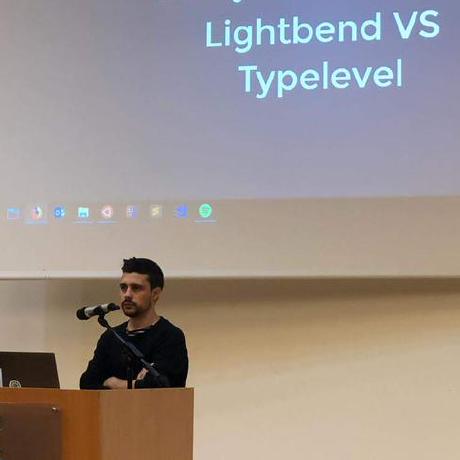How to compose Future and Option in Scala
Update (June 24, 2016) : New example using Hamsters lib
In Scala, it’s easy to compose options :
val oa: Option[String] = Some("a")
val ob: Option[String] = Some("b")
val oab : Option[String] = for{
a <- oa
b <- ob
} yield a+bNote : you can read my helper about for comprehension translation to map/flatMap.
It’s also easy to compose futures, in a non blocking way :
def fa: Future[String] = Future("a")
def fb(a: String): Future[String] = Future(a+"b")
val fab : Future[String] = for{
a <- fa
ab <- fb(a)
} yield abBut is it easy to compose several Future[Option[A]]? It’s a common problem if you call sequentially several external resources, that can give you one or zero value.
def foa: Future[Option[String]] = Future(Some("a"))
def fob(a: String): Future[Option[String]] = Future(Some(a+"b"))
/* can't compose like this : type mismatch
val composedAB = for {
optA <-foa
a <- optA // option instead of Future
ab <- fob(a)
}yield ab
*/We can’t compose easily fob and foa: types will mismatch because futures and options don’t compose naturally.
Fortunately, there are some solutions.
Handmade binding
You can solve this with pattern matching :
val composedAB: Future[Option[String]] = foa.flatMap {
case Some(a) => fob(a) //(*)
case None => Future.successful(None)
}(*) : In the for, call fob with the value inside the option and get a Future[Option[String]].
Doing this, you can compose result from foa and fob and keep consistent types.
Using a custom FutureO monad
This is an idea from Edofic’s blog. It allows more natural composition of Option and Future types.
You can create a custom FutureO monad that will compose well with other FutureO instances.
You just need to define a constructor and flatMap (plus map as it’s used by for comprehension syntactic sugar) :
case class FutureO[+A](future: Future[Option[A]]) extends AnyVal {
def flatMap[B](f: A => FutureO[B])(implicit ec: ExecutionContext): FutureO[B] = {
val newFuture = future.flatMap{
case Some(a) => f(a).future
case None => Future.successful(None)
}
FutureO(newFuture)
}
def map[B](f: A => B)(implicit ec: ExecutionContext): FutureO[B] = {
FutureO(future.map(option => option map f))
}
}Then you can use a simple for comprehension form :
val composedAB2: Future[Option[String]] = (for {
a <- FutureO(foa)
ab <- FutureO(fob(a))
}yield ab).futureOr, with flatMap :
val noSugarComposedAB2 = FutureO(foa).flatMap(a => FutureO(fob(a))).futureUsing a Scalaz monad transformer
Finally, if you want to generalize this kind of usage, you should try Scalaz monad transformers, which work for a larger kind of types than options and futures.
import scalaz._
import Scalaz._
import scalaz.OptionT._
// We are importing a scalaz.Monad[scala.concurrent.Future] implicit transformer
val composedAB3: Future[Option[String]] = (for {
a <- optionT(foa)
ab <- optionT(fob(a))
}yield ab).runUpdate : Using Hamsters monad transformers
Since the moment I wrote this post, I’ve made a small library that provides (among other things) some simple monad transformers :
val composedAB: Future[Option[String]] = for {
a <- FutureOption(foa)
ab <- FutureOption(fob(a))
} yield abYou can find more information about Hamsters here.
